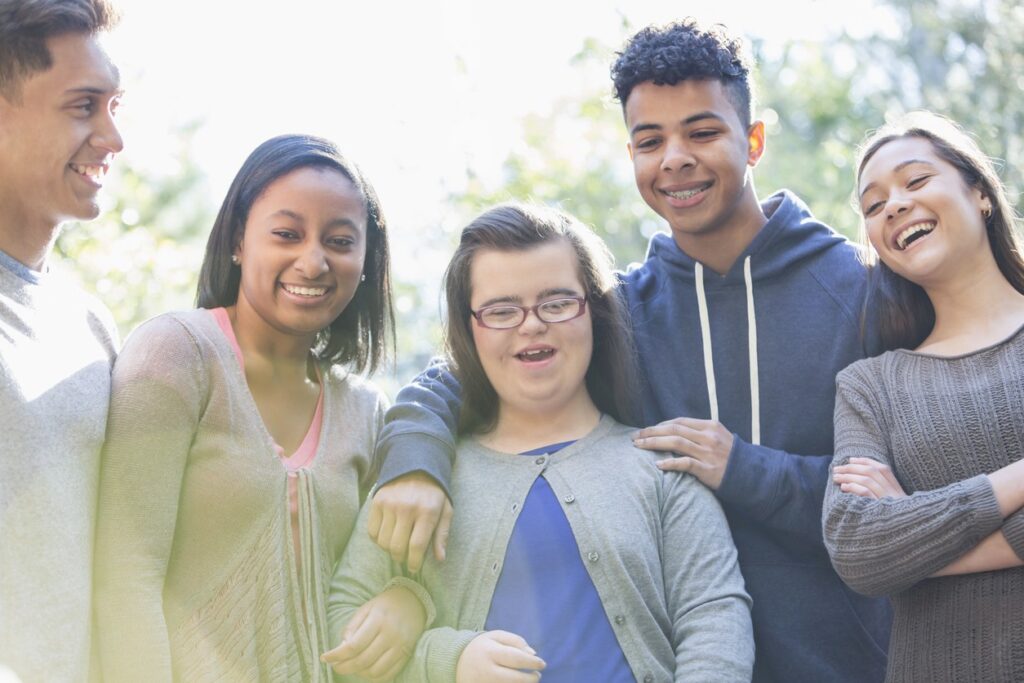Successful Transitions to Adulthood for Youth with I/DD
October 6, 2025

There are many factors to consider when thinking about the transition to adulthood for your child with intellectual and developmental disabilities (I/DD).
Careful planning, often starting as early as age 14, can help your child move from school-based services to adult life with confidence. This guide provides practical steps, helpful tips, and trusted resources to support your child in preparing for adulthood.
New to case management or transitioning from children’s services? Click here to learn more about getting started.
Transition planning at school from ages 14-21
In Colorado, students with I/DD can continue receiving school district services until age 21, even if they participate in a graduation ceremony. However, there is a difference between walking at the graduation ceremony and accepting a diploma, which signifies graduation and the departure from school. Accepting a diploma officially ends eligibility for school services, so families should consider timing carefully.
Schools are required to provide transition planning services for students with I/DD starting at age 14, which will help your child identify interests, goals, and skills for adulthood.
A strong transition plan helps your child:
- Increase independence
- Identify life goals
- Build job and life skills
Tips for families
- Ask your child’s school about all available transition supports.
- Encourage volunteer or work-based learning opportunities during school to further your child’s opportunities to explore different paths.
- Connect with the Division of Vocational Rehabilitation (DVR) at least six months before graduation for employment planning.
- Explore additional resources through the Division of Workforce Development.
- Support your child in practicing self-advocacy and learning about their disability.
Key steps to take at age 17 and beyond
At RMHS, children receiving I/DD case management services are automatically referred to adult services before turning 18. Families participate in Options Counseling to decide which adult Medicaid waiver best fits their child’s needs.
In addition to transitioning to adult case management services, families should begin planning in the following important areas around age 17:
1. Guardianship and decision-making
At age 18, young people are legally recognized as adults and can make their own medical, financial, and personal decisions. Parents or caregivers cannot continue making these decisions without legal arrangements.
Options to consider:
- Guardianship: A court grants parents or another adult legal authority to make decisions in specific areas where support is required. Guardianships are typically limited to clearly defined areas.
- Supported decision-making: Allows individuals with I/DD to make their own decisions with support from trusted family, friends, or mentors. Agreements are personalized and outline the supporter’s role.
Guardianship & supported decision making resources
- Guardianship Alliance of Colorado
Provides private and volunteer guardianship services in Colorado. - Colorado Legal Services
Provides legal help for low-income Coloradans for civil legal needs, including guardianship. - Colorado Office of Public Guardianship
For adults who don’t have someone to serve as a guardian, a request can be made for a public guardian.
2. Financial planning
Financial independence in adulthood requires careful preparation, especially if your adult child will utilize Medicaid and/or Supplemental Security Income (SSI).
Key steps:
- Open a bank account in your child’s name at age 18:
It’s important to keep your money and your child’s money separated once they enter adulthood. - Apply for Supplemental Security Income (SSI) at age 18:
Eligibility is based only on your child’s income and resources and excludes parental income. SSI also provides automatic Medicaid access. - Consider a Special Needs Trust or ABLE Account:
These accounts safeguard assets, cover long-term expenses (like medical care, transportation, and housing), and protect SSI/Medicaid eligibility.
Financial planning resources
- Probate Power
Provides legal guidance for families on special needs planning. - Special Needs Answers
Provides information and resources for parents and families of individuals with special needs. - Colorado Fund for People with Disabilities
Supports with supplemental needs trusts, conservatorships, trust advisory services and representative payee services.
3. Employment, community, and skill-building opportunities
Employment, skill development, and community participation help young adults with I/DD build independence and confidence.
Employment & community resources
- Division of Vocational Rehabilitation Employment
A state department that supports people with disabilities explore their employment goals by connecting them to resources. - Teaching the Autism Community Trades (TACT)
Trade and technical training designed for children and young adults with autism spectrum disorder. - Celebrate EDU
Empowers people with disabilities through online self-advocacy and entrepreneurship education. - Ability Connection RAMP
Offered through Ability Connection Colorado, the RAMP Project provides evidence-based, career-focused mentoring and career exploration opportunities for youth with disabilities. - Access Gallery
Access Gallery is a nonprofit dedicated to inclusive arts-based learning and economic opportunities for artists with disabilities. - Denver 3-1-1 Call Center
The 311 Call Center provides information about Denver City services and resources. Just dial 3-1-1.
Preparing for a Confident Transition
The journey to adulthood for youth with I/DD can feel both daunting and full of possibility. By starting early, building a strong transition plan, and connecting with the right supports, you’ll help your child step into adult life with greater independence and opportunity.
At RMHS, we’re here to support the transition from children’s to adult case management services while also connecting families to the broader network of organizations that specialize in guardianship, financial planning, employment, community connections, and more.
Together, we can help your child enter adulthood with the tools, confidence, and resources they need to thrive.






